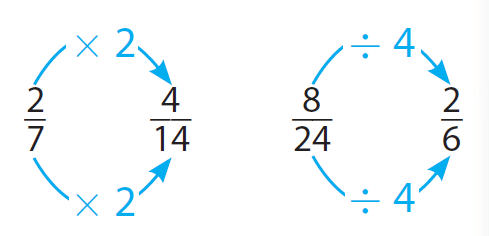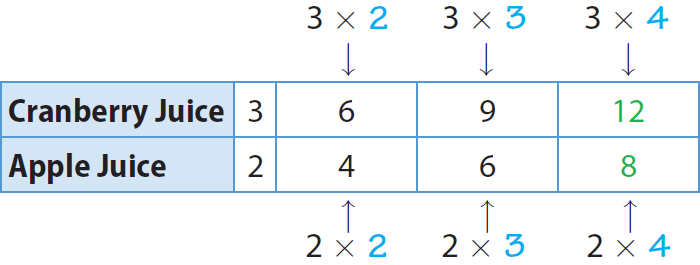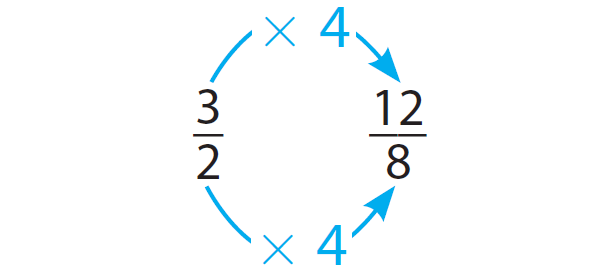EQUIVALENT RATIOS
Subscribe to our ▶️ YouTube channel 🔴 for the latest videos, updates, and tips.
Equivalent ratios are ratios that name the same comparison. we can find equivalent ratios by using a multiplication table or by multiplying or dividing both terms of a ratio by the same number.
So, ratios which are equivalent have a multiplicative relationship. A ratio with terms that have no common factors is said to be in simplest form.

To find ratios which are equivalent to a ratio, multiply the terms of the original ratio by the same number.
That is, multiply the terms of the original ratio by 2, 3, 4 and so on.
Example 1 :
Write three ratios which are equivalent to the ratio given below.
2/3
Solution :
(2/3) x (2/2) = 4/6
(2/3) x (3/3) = 6/9
(2/3) x (4/4) = 8/12
Three ratios which are equivalent to the ratio 2/3 are
4/6, 6/9 and 8/12
Example 2 :
Write four ratios which are equivalent to the ratio given below.
5/4
Solution :
(5/4) x (2/2) = 10/8
(5/4) x (3/3) = 15/12
(5/4) x (4/4) = 20/16
(5/4) x (5/5) = 25/20
Three ratios which are equivalent to the ratio 8/10 are
10/8, 15/12, 20/16 and 25/20
Example 3 :
David makes 5 cups of punch by mixing 3 cups of cranberry juice with 2 cups of apple juice. How much cranberry juice and how much apple juice does David need to make four times the original recipe ?
Solution :
Method 1 : Using table
Step 1 :
Make a table comparing the numbers of cups of cranberry juice and apple juice needed to make two times, three times, four times, and five times the original recipe.

In the above table, both terms of the original ratio are multiplied by the same number to find an equivalent ratio.
Step 2 :
The last column of the table shows the numbers of cups of the two juices David needs for four times the original recipe.
David needs 12 cups of cranberry juice and 8 cups of apple juice.
Method 2 : Multiplying both terms of the ratio by the same number.
Step 1 :
Write the original ratio in fraction form.
That is,
3/2
Step 2 :
Multiply the numerator and denominator by the same number. To make four times the original recipe, multiply by 4.
That is,

To make four times the original recipe, David will need 12 cups of cranberry juice and 8 cups of apple juice.
Example 4 :
Alex makes an alloy by mixing two types of metals, say A and B. To make one unit of alloy, he needs 12 grams of metal A and 17 grams of metal B. If he makes, 5 units of alloy, how many grams of metal A and metal B does he need ?
Solution :
Step 1 :
Alex needs 12 grams of metal A and 17 grams of metal B to make 1 unit of alloy.
From the above information, the ratio between metal A and metal B to make 1 unit of alloy is
12/17
Step 2 :
Since Alex makes 5 units of alloy, we have to multiply the numerator and denominator of the above ratio by 5.
(12/17) x (5/5) = 60/85
To make 5 units of alloy, Alex needs 60 grams of metal A and 85 grams of metal B.
Subscribe to our ▶️ YouTube channel 🔴 for the latest videos, updates, and tips.
Kindly mail your feedback to v4formath@gmail.com
We always appreciate your feedback.
About Us | Contact Us | Privacy Policy
©All rights reserved. onlinemath4all.com

Recent Articles
-
Digital SAT Math Problems and Solutions (Part - 23)
Feb 27, 26 04:01 AM
Digital SAT Math Problems and Solutions (Part - 23) -
Digital SAT Math Problems and Solutions (Part - 22)
Feb 26, 26 08:43 PM
Digital SAT Math Problems and Solutions (Part - 22) -
10 Tricky SAT Math Questions with Answers
Feb 25, 26 08:07 AM
10 Tricky SAT Math Questions with Answers

